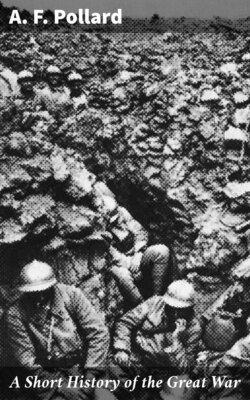Читать книгу A Short History of the Great War - A. F. Pollard - Страница 7
На сайте Литреса книга снята с продажи.
ОглавлениеVon Kluck had committed the error of underrating his foes, and assuming that they had been broken beyond the chance of reaction; for to march across the front of an army that is still able to strike is inviting disaster, and Joffre had at last been able to shift his weight from east to west to cope with Von Kluck's unexpected attack through Belgium. Maunoury's army debouched from Meaux and began fighting its way to the Ourcq, a little river which runs southwards into the Marne at Lizy, while the British emerged from the Crecy forest and drove the Germans back to the Grand Morin. D'Esperey made headway against the bulk of Von Kluck's army between La Fert-Gaucher and Esternay, while Foch held his own against Von Buelow and Von Hausen's right, and Langle against the Duke of Wrttemberg. Sarrail's Third army had, however, to give a little ground along the Meuse. The morrow's tale was similar: most progress was made by the British, who drove the Germans across the Grand Morin at Coulommiers, and thus enabled D'Esperey to do the like with Von Kluck's centre. On the 8th, however, Maunoury was hard pressed by Von Kluck's desperate efforts to deal with this sudden danger; but reinforcements poured out from Paris, the British gained the Petit Morin from Trilport to La Trtoire, while D'Esperey carried victory farther east and captured Montmirail. By 11 a.m. on the 9th Von Kluck's army was ordered to retreat, thus exposing Von Buelow's right, and giving Foch his opportunity for the decisive stroke of the battle.
It consisted of two blows, right and left, and both came off late on the 9th. Maunoury's counter-attack on the left had compelled the Germans to weaken their centre. Not only was Von Buelow's right exposed, but a gap had been left between his left and Von Hausen's right, possibly for troops which were detained at Maubeuge or had been diverted to East Prussia. Nor was this all, for his centre was bogged in the famous marshes of St. Gond. Foch struck hard at Von Buelow's centre, right, and left, and by the morning of the 10th he had smashed the keystone of the German arch. Meanwhile, on the 9th Maunoury had cleared the Germans from the Ourcq, the British had crossed the Marne at Chngis, and reached it at Chteau-Thierry, and D'Esperey farther east. Von Kluck now received considerable reinforcements which Von Buelow needed more, and the latter's rapid retreat made even reinforcements useless for holding the Ourcq. It was equally fatal to success against Langle and Sarrail, and on the 10th the German retreat became general. By the end of the week the Germans were back on a line running nearly due east from a point on the Oise behind Compigne to the Aisne, along it to Berry-au-Bac, and thence across Champagne and the Argonne to Verdun. They had failed in Lorraine as well, where the climax of their attack was from the 6th to the 9th. Castelnau then took the offensive, and by the 12th had driven the Bavarians from before Nancy beyond the Meurthe, and out of Lunville and St. Di.
The German right had fallen back thirty-five miles and the centre nearly fifty; but the retreat was not a rout, and the losses in guns and prisoners were meagre. The first battle of the Marne was important by reason of what it prevented the Germans from doing, rather than by reason of what the Allies achieved, and they had to wait nearly four years for that precipitate evacuation of France which it was hoped would follow upon the German repulse from the Marne in September 1914. Nevertheless it was one of the decisive battles and turning-points of the war. The German surprise, so long and so carefully prepared, had failed, and the knockout blow had been parried. The Allied victory had not decided how the war would end, but it had decided that the war would be long--a test of endurance rather than of generalship, a struggle of peoples and a conflict of principles rather than duel between professional armies. There would be time for peaceful and even unarmed nations to gird themselves in defence; and the cause of democracy would not go down because military autocrats had thought to dispose of France before her allies could effectively intervene.
